The final category in our library engagement typology represents the almost 15% of Americans ages 16 and older who have never personally used a public library in their lifetime. These “never” library users break out into two non-engagement groups: Distant Admirers and Off the Grid. Though neither group has any personal library experience, they have different opinions of libraries and differing views on libraries’ roles in their communities.
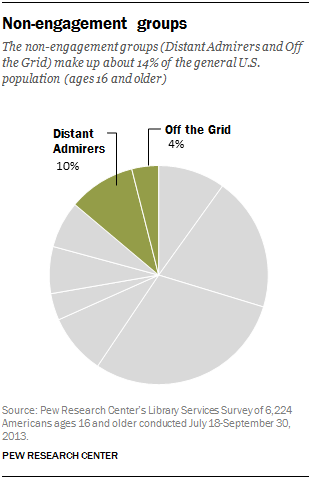 The first non-engagement group, Distant Admirers, represent the majority of non-users. Despite their lack of personal library use, many say that someone else in their household is a library user—and may rely indirectly on many library services. And while many say that their library’s closing would not affect them personally, most say it would have a major effect on their community.
The first non-engagement group, Distant Admirers, represent the majority of non-users. Despite their lack of personal library use, many say that someone else in their household is a library user—and may rely indirectly on many library services. And while many say that their library’s closing would not affect them personally, most say it would have a major effect on their community.
Demographically, Distant Admirers include a higher proportion of men than the U.S. population as a whole, and tend to be slightly older than the national benchmark; adults in this group are also more likely to report lower levels of education and household income. Many do not follow the news or read often. One way their relationship to libraries stands out from the other non-engagement groups is that Distant Admirers who say that another member of their household uses the library are actually more likely than some of the library-using groups to value individual library services; however, those without even household exposure often do not view libraries as potentially relevant to their lives.

Meanwhile, those in the Off the Grid group are disconnected in many ways—from their communities, from libraries, from technology and information sources. They’re more likely to be older than the general population, more likely to be living in rural areas, and less likely to know the names of many of their neighbors; they also tend to have low levels of reading and technology use. Like Distant Admirers, they have never used a public library themselves, but few Off the Grid respondents have indirect exposure to libraries via someone else in their household; as a result, few know very much about libraries in general, and many say visiting one would be difficult even if they wanted to. They also tend to be more ambivalent about the role that libraries play in their communities, and have the least positive views of libraries among all the groups.
Distant Admirers
Overview
Distant Admirers make up three-quarters of the “no library experience” group. Despite their lack of personal library use, many say that someone else in their household is a library user—and may rely indirectly on many library services. And while many say that their library’s closing would not affect them personally, most say it would have a major effect on their community.
Demographically, Distant Admirers include a higher proportion of men than the general population. As a group, they also tend to be slightly older than the national benchmark, and are more likely to report lower levels of education and household income. Many do not follow the news or read often (27% did not read a book last year). Interestingly, those who say that another member of their household uses the library are actually more likely than some other groups to value individual library services, but those without even household exposure may not see how a library would be relevant to their lives.
Who they are
Demographics
As a group, Distant Admirers include a higher proportion of men than the general population (56% are male, and 44% are female). This group is also more diverse compared with many other groups, as well as the population as a whole: over a quarter (27%) are Hispanic, most of whom were born outside the United States. Distant Admirers are also more likely to be older than the general population, though not by much (their median age is 48). They also tend to report lower levels of education and lower household income: 42% live in households earning less than $30,000 per year, and six in ten did not attend college.

Other lifestyle notes
Distant Admirers are more likely than the general population to live in a small city or town, and as with several other low or non-engagement groups, there are some indications that they are more isolated in their communities. For instance, as many as 37% say they do not know the names of any of their neighbors, compared with 26% of the general population. They are also less likely to describe their community positively (77% do, compared with 82% of the general population), and are less likely to feel they can have even a moderate effect on their community (62% say this, compared with 72% of the general population).
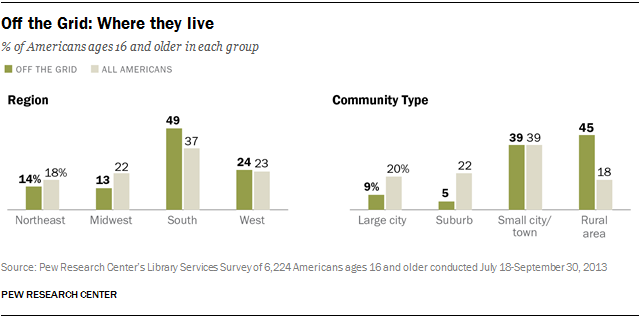
Distant Admirers are also less likely to be regularly engaged in several community activities, part of the context for their lack of library engagement. In this they are similar to the low engagement group Rooted and Roadblocked, with almost half (48%) saying they don’t do any of these activities regularly.
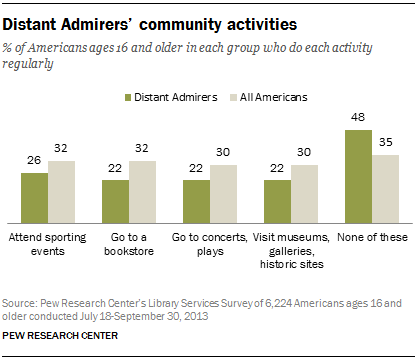
Technology and information habits
In terms of their technology and information habits, Distant Admirers tend to be somewhat less connected than other groups. They are less likely to read regularly, and 27% read no books in the past year; as a group, they read an average of 8 books in the past 12 months, and a median of 3. Most (72%) do use the internet, but only about half (51%) have home broadband. Many say they would need help using new technologies if they wanted to in the future, particularly if they wanted to use a new device like a tablet computer or smartphone.
Technology use
Distant Admirers have lower levels of technology use then the American population as a whole, but not dramatically so. Most use the internet at least occasionally, and over half access the internet on mobile devices. Most internet users in this group go online on a daily basis, and two-thirds use social media (though these rates are again lower than national levels). However, only about half (51%) have broadband at home, compared with 71% of all Americans.

Defining information traits
 In terms of media habits, Distant Admirers are more likely to watch television daily (84% do this on a daily or near-daily basis), but otherwise they are less likely to do each of the activities we asked about. For instance, only 48% read the newspaper daily, and just 30% read a book that often.
In terms of media habits, Distant Admirers are more likely to watch television daily (84% do this on a daily or near-daily basis), but otherwise they are less likely to do each of the activities we asked about. For instance, only 48% read the newspaper daily, and just 30% read a book that often.
As a group, Distant Admirers read an average of 8 books in the past 12 months, and a median of 3. Some 27% read no books in the past year, higher than national levels. Some 22% do visit bookstores regularly (lower than the 32% of the general population who do this), and they are a little more likely to borrow books (44%) than general population—another 45% prefer to purchase their books.
Looking at their information attitudes more broadly, Distant Admirers are less likely to say they like to learn new things (58% say this, compared with 69% of the general population). In response to a separate question, they were more likely to say they feel overloaded with too much information these days, though most still say they like having so much information available. Many also say they would need help using new technologies if they wanted to in the future: Just about half (52%) say they would feel comfortable using social media like Facebook or Twitter to connect with friends or family on their own, but only 37% say they would be able to how to use a new device like a tablet computer or smartphone without assistance.

Relationship to public libraries
Despite their lack of personal library use, quite a few members this group say that someone else in their household is a library user—and there are indications that some Distant Admirers rely indirectly on many library services. They also tend to view libraries as vital community resources: Even though many say that their library’s closing would not affect them personally, most agree it would have a major effect on their community.
Public library use and experiences
About 37% Distant Admirers say they have library cards, a similar rate as low engagement groups. However, none have ever used a public library personally, either by visiting a public library or using a library website. They do have some household exposure: 40% say that someone else in their household uses the library, and among parents of minors, 43% say their children have visited a library in the past year (though lower than the 70% of all parents who say this). Almost eight in ten (78%) say they do know where the closest public library is, with most saying the closest library is within five miles of where they live.
Public library attitudes
As their name implies, Distant Admirers generally have positive views of libraries, though their support is not quite as strong as library-using groups in some areas. They are somewhat more ambivalent about the current role of libraries in the digital age.
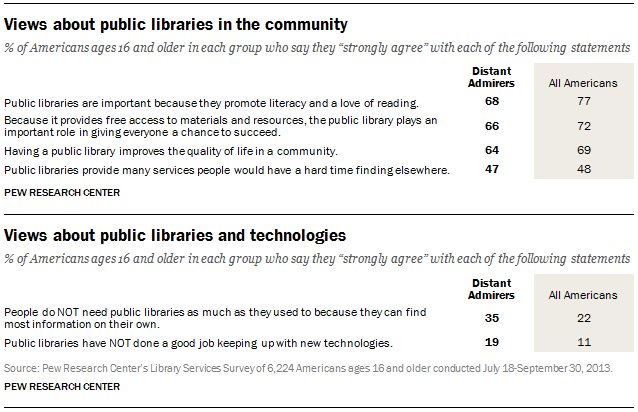
 What sets Distant Admirers apart from the other non-engagement group is that even though they don’t personally use the library, they are just as likely as the general population to say that if the local public library closed it would have a “major” impact on them and their family (though they were also more likely to say it would have no impact). A majority (55%) also say it would have a major impact on the community.
What sets Distant Admirers apart from the other non-engagement group is that even though they don’t personally use the library, they are just as likely as the general population to say that if the local public library closed it would have a “major” impact on them and their family (though they were also more likely to say it would have no impact). A majority (55%) also say it would have a major impact on the community.
Among those with a household member who uses the library, Distant Admirers are actually more likely than the national benchmark to highly value almost all of the services libraries offer, even though they do not use those services themselves. Only 19% say that none of these services are very important.

Off the Grid
Overview
The Off the Grid group sits at the farthest end of the spectrum of library engagement. A small group representing just a quarter of non-library users and 4% of the entire U.S. population, they are disconnected in many ways—not only from libraries, but from their communities, from technology, and from information sources.
Off the Grid respondents generally have the least positive views of libraries among all the groups. In line with their extremely low levels of contact with public libraries, almost two-thirds (66%) say that if the local public library closed it would have no impact on them and their family. However, one factor that sets the “Off the Grid” group apart from the others is how small of a role its respondents felt that libraries play in their communities. Fewer than one in three (28%) of those “Off the Grid” say their library’s closing would have a major impact on their community, and another one in four (25%) say it would have no impact at all.
Off the Grid respondents tend to be older, and often live in rural areas; many don’t know many of their neighbors, and they tend to have low levels of reading and technology use. Almost half don’t use the internet, the highest rate of any group.
Like Distant Admirers, they have never used a public library themselves, but few in this group have regular exposure to libraries through someone else in their household; as a result, they don’t know much about libraries, and many say visiting one would be difficult even if they wanted to.
Who they are
Demographics
As a group, Off the Grid respondents include a disproportionate amount of men compared with the general population, and also include more older adults (their median age is 52). They are more diverse than most other groups—though not to the same extent as Distant Admirers—and are more likely to have completed the survey’s interview in Spanish (15% did so).
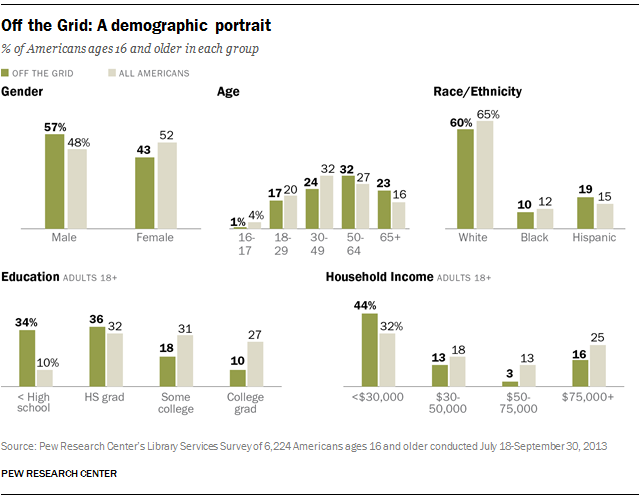
Many Off the Grid respondents face economic barriers in their lives. They are more likely to have low levels of education, with a third of adults in this group reporting that they did not complete high school, and only one in ten having graduated college; they are also more likely to live in lower-income households, with 44% living in households earning less than $30,000 per year. Less than half (46%) are employed, either full- or part-time.
Other lifestyle notes
Off the Grid members are far more rural than Distant Admirers, and in fact are one of the most rural groups in the typology. Hardly any members of this group live in a large city or suburb; 39% say they live in a small city or town, and 45% say they live in a rural area. They have also lived in their neighborhoods for longer—37% have lived in their current neighborhood for more than 20 years—but almost four in ten (38%) say they don’t know the names of anyone who live close by.
Members of this group are less likely than several other groups to think their community is a “good” or “excellent place to live,” and they are much less likely to feel like they can effect change in their communities: Only 50% of those in the “Off the Grid” group feel they can have even a moderate impact on their community, compared with 72% of the general population.

 Among all the groups, those “Off the Grid” are the least engaged in the community activities we asked about—and a majority say they don’t do any of these activities regularly.
Among all the groups, those “Off the Grid” are the least engaged in the community activities we asked about—and a majority say they don’t do any of these activities regularly.
Politically, they are more likely to be both conservative: 15% identify as very conservative (twice the national rate). However, another 16% don’t know their ideological leaning. Another 10% have no party preference, and 5% don’t know their affiliation.
Technology and information habits
Members of this group are less likely to use the internet or own mobile devices, behaviors that are strongly correlated with age, household income, and education. They are less engaged with various types of media, and are less comfortable navigating several types of information.
Technology use

In keeping with their name, just over half (56%) of the members of the “Off the Grid” group use the internet, far lower than the national benchmark of 86%. They are likewise less likely to own or use mobile devices, with only 33% reporting that they own a smartphone.
Defining information traits
 We named this group “Off the Grid” due to their lower levels of engagement in many spheres. For instance, while they are as likely to watch television daily as the general population, they otherwise are far less likely to socialize with friends and family on a daily basis, listen to music or the radio, or follow the news. They are also less likely to say they enjoy keeping up with the news in general.
We named this group “Off the Grid” due to their lower levels of engagement in many spheres. For instance, while they are as likely to watch television daily as the general population, they otherwise are far less likely to socialize with friends and family on a daily basis, listen to music or the radio, or follow the news. They are also less likely to say they enjoy keeping up with the news in general.
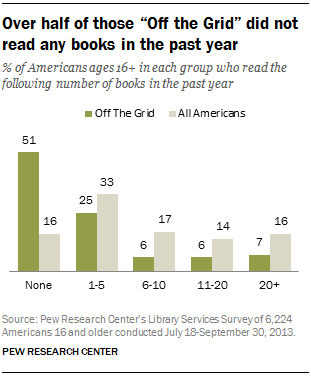 Off the Grid respondents also have very low rates of engagement with books and reading:
Off the Grid respondents also have very low rates of engagement with books and reading:
- 51% read no books in the past year. (Among all Americans ages 16 and older, only 16% did not read any books in that time.)
- Only 25% say they read books daily (in any format), compared with 41% of the general population.
- Overall, Off the Grid respondents read an average of 5 books in the past 12 months; since a majority read no books in the past year, the median for the whole group is 0. Among those who did read a book last year, the average number read is 10 and a median number is 4, which is still lower than the national benchmark.
- About one in ten (11%) Off the Grid respondents visit bookstores regularly, roughly a third of the national rate.
Off the Grid respondents are less likely than most other groups to say they are comfortable learning new things, and they stand out for the obstacles they face in their abilities to navigate different types of information. Fewer than half say it would be easy for them to find information about government benefits and programs, for instance, and only 63% say they feel they could easily locate reliable health information.
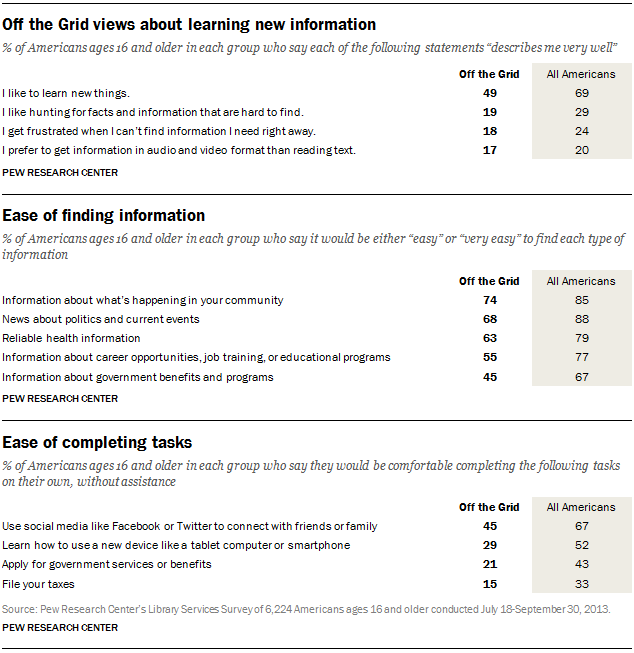
Finally, a majority of Off the Grid respondents would need help completing various tasks, particularly those centered around using the internet or newer technologies. Some 36% would not be comfortable doing completing any of the tasks we asked about on their own.
Relationship to public libraries
Public library use and experiences
As with other non-engagement group, none of those in the Off the Grid category have ever visited a public library or used a library website. Some 19% do say they have library cards, although this is the lowest rate of any group in the typology.
Most (75%) members of this group say they do know where the closest public library is, with a majority reporting that the closest library is more than five miles away from where they live. However, the data suggests many would encounter difficulties if they did want to use library resources: 24% say it would be difficult to visit a library in person, and 38% say it would be difficult for them to use a library website.
Public library attitudes
Few Off the Grid respondents have positive views of libraries—setting them apart even from the other non-engagement group, Distant Admirers. For instance, less than half (45%) Off the Grid respondents “strongly agree” that public libraries play an important role in giving everyone a chance to succeed by providing access to materials and resources, a view that is otherwise shared by 72% of the general population; only four in ten (39%) strongly feel that public libraries improve the quality of life in a community. They are also more likely to feel that libraries not as necessary today for finding information due to technological advances, though due to their overall lack of exposure to public libraries, many were give an opinion one way or another.


In line with their extremely low levels of contact with public libraries, almost two-thirds (66%) say that if the local public library closed it would have no impact on them and their family. Even more striking is how small of a role its respondents felt that libraries play in their communities: Only 28% of those “Off the Grid” say their library’s closing would have a major impact on their community, and another 25% say it would have no impact at all.7



 Quiz
Quiz